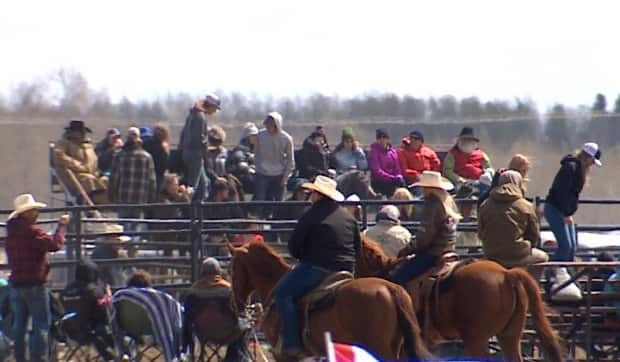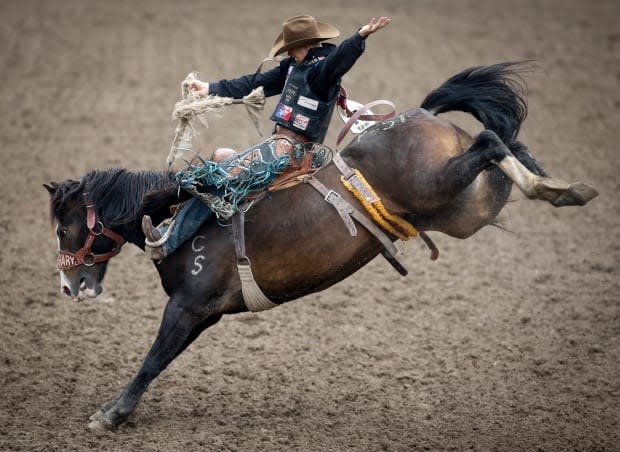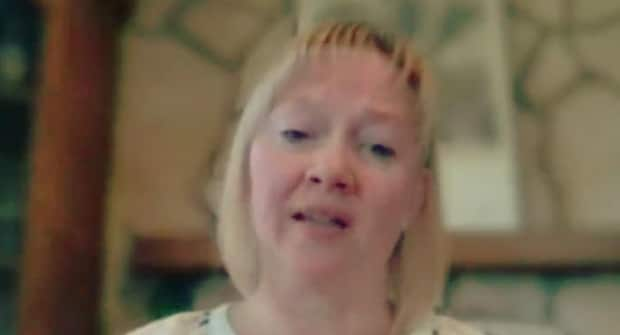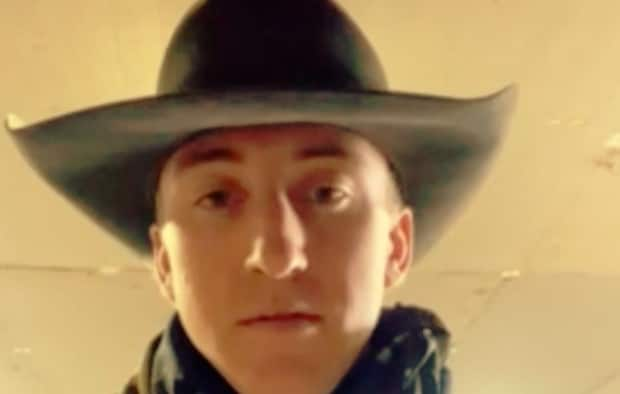Fallout from rogue event worries other Alberta rodeo organizers

Tanya Froh has already seen her beloved Little Britches rodeo fall victim to the pandemic once. The president of the High River Agricultural Society doesn't want to see it happen a second time — possibly the result of a rogue rodeo and rally held earlier this month near Bowden, Alta.
It's a possible ripple effect rodeo organizers, competitors and stock contractors fear from the so-called "No more lockdowns rodeo rally," which drew hundreds and resulted in a charge against the organizers for violating the Public Health Act.
Some say the event — marked by anti-maskers, anti-vaxxers and COVID deniers — made their sport look bad, and that it reinforced long-held stereotypes about Western Canada.
"It could be seen as a bit of a black eye," said Froh.
"There were so, so many people that are unhappy with how that has gone."
It was an unfortunate event, said one former rodeo competitor who didn't want his name used, that showcased some "hillbillies and rednecks."
The pandemic has hit the rodeo community hard with cancelled events, fans shut out and sponsorships put on hold.
Rodeos can be a lifeline for some small, rural communities, and the sport has been slowly coming back to life.

But there's concern the Bowden event could threaten that recovery.
Amateur rodeos — involving high school kids and "weekend warriors" as old as 60 — have been held this year under a special exemption from Alberta Health Services (AHS).
The indoor and outdoor events have to follow a number of protocols, including no spectators, mandatory mask use and physical distancing.
Many amateur rodeo organizers are reluctant to talk about their events — fearing that, by drawing attention to themselves, they could either lose an existing exemption or jeopardize a future application.

Alberta High School Rodeo, the Chinook Rodeo Association, the Foothills Cowboy Association and the Wildrose Rodeo Association — all of which have recently, or soon will, run events — either declined to comment or didn't respond to interview requests.
The Chinook association posted a statement on its website distancing itself from the Bowden event, saying it is focused on working with AHS and others to see the return of the sport.
Many stock contractors, the companies that provide the animals for rodeo events, were also reluctant to comment on Bowden.
"I distance myself from it. I want nothing to do with it," said Dustin Duffy, whose family has run Duffy Rodeo for 40 years, when pressed.
He preferred talking about his efforts to get the sport back on track.
Duffy has been part of a group working with AHS to establish protocols that could see pro and amateur rodeos and other western events return with small crowds this year.
He says they're waiting for the third wave of the pandemic to subside before they can get a clearer picture of what the season might look like.

"If we follow our protocols, and we follow the guidance of the government … we are working as a partner with the government to get this stuff back going," he said.
The Canadian Professional Rodeo Association (CPRA), which oversees dozens of events that generate $5.7 million in prize money for competitors, has already cancelled several events this year. It also said it had nothing to do with the Bowden event. The CPRA is instead focused on following the existing rules with an eye to hopefully seeing those restrictions eased.
"The world is divided in terms of people that are sick and tired of sitting at home and want to go and compete. I get that," said Jeff Robson, the CPRA's general manager.
He says the group is planning to livestream some events without fans, but nothing has been finalized.
'Felt like normal'
The Bowden event has some supporters. Colt Cornet, 21, a professional tie-down roper from Brant, Alta., competed there. He says it's how he makes his living and how he pays his bills and he wasn't going to miss the opportunity to compete.
"People were genuinely happy to be at a rodeo event and so were the contestants," he said.
"It was nice to be back to what felt like normal again."
Cornet said he was there to compete rather than send a political message.
Davey Shields, Jr., a former professional bareback rider who won the Calgary Stampede four times, says if he was still competing there's a good chance he would have taken part too.
"I think people need to start standing up, if they want things to change. If they don't stand up, nothing's gonna change, the government's just gonna keep running us over," he said his home near Calgary.
Meanwhile, Froh and her team at the High River Agricultural Society are working with AHS to secure an exemption for the Little Britches rodeo, which they are hoping to host June 12.
But there's a lot of uncertainty.
The society submitted its exemption application more than a month ago and, aside from getting a confirmation that their application has been received, there's been no word.
"We've heard nothing," said Froh.
"We're hoping that we get to carry on as we were."
Bryan Labby is an enterprise reporter with CBC Calgary. If you have a good story idea or tip, you can reach him at bryan.labby@cbc.ca or on Twitter at @CBCBryan.

